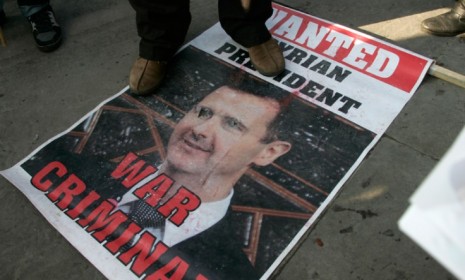Would Syria's Assad use chemical weapons on his own people?
A defector warns that Syrian President Bashar al-Assad won't hesitate to use his weapons of mass destruction if he gets cornered

A free daily email with the biggest news stories of the day – and the best features from TheWeek.com
You are now subscribed
Your newsletter sign-up was successful
The Obama administration on Tuesday said it was worried that Syrian President Bashar al-Assad might use his country's huge stockpile of chemical weapons against his own people if rebels get closer to destroying his regime (a suicide bomber killed Assad's defense minister on Wednesday). The Wall Street Journal reported Friday that Syrian soldiers were moving some of the weapons out of storage, although the Syrian foreign ministry said that was "absolutely ridiculous and untrue." The White House warned Assad he would be accountable if the material is used or falls into terrorists' hands, a nightmare scenario that the U.S. has been developing plans to prevent. Syria's former ambassador to Iraq, Nawaf Fares, said Assad is like a "wounded wolf" and would "eradicate the entire Syrian people" if the 17-month uprising against his regime gets close to toppling him. Would Assad really pull the trigger? Here, a brief guide:
How many chemical weapons does Syria have?
Only the Assad regime knows for sure, but Syria is believed to have one of the world's largest stockpiles of chemical weapons, including sarin nerve agent, mustard gas, cyanide, and even VX, which are among the most dangerous chemicals ever created. It's unclear how much of each type of poison Assad has, but Syria is one of only seven nations that never signed the 1992 Chemical Weapons Convention, the arms-control agreement that outlaws the production and use of these weapons.
The Week
Escape your echo chamber. Get the facts behind the news, plus analysis from multiple perspectives.

Sign up for The Week's Free Newsletters
From our morning news briefing to a weekly Good News Newsletter, get the best of The Week delivered directly to your inbox.
From our morning news briefing to a weekly Good News Newsletter, get the best of The Week delivered directly to your inbox.
Does Assad have the ability to use them?
The country's military reportedly can put its chemical agents into Scud missile warheads, or specialized artillery shells. Still, it's hard to use such weapons effectively on the battlefield. Sarin, for example, can be used to poison water supplies, but it's hard to control it when it's used as a gas against people on the ground. If something goes wrong, Assad's own forces could suffer the consequences. A 2007 accident involving mustard gas at one of his chemical-weapons factories killed several people.
Would he use them?
Fares' warning about Assad's willingness to tap the arsenal if rebels continue to make gains rings true in diplomatic and military circles, given his bloody crackdown against the uprising. Yes, says the BBC's Frank Gardner, but Fares does "have a vested interest in discrediting the regime which he has just deserted." Maybe, but it would be folly to discount the danger, Joseph Holliday, a former Army intelligence officer and an analyst at the Institute for the Study of War, tells The Wall Street Journal. "If we believe the Assad regime and their closest allies view this as an existential struggle, we have to assume they could use chemical weapons against their population at some point."
A free daily email with the biggest news stories of the day – and the best features from TheWeek.com
Could Assad save his regime by using chemical weapons?
Assad might actually regret making such a move. If Assad or a rogue Syrian military commander uses chemical weapons against insurgents or one of his neighbors — Turkey has welcomed defectors and served as a path for arms shipments to rebels — he would face "devastating retaliation" from Turkey, for one, Kemal Kaya, a defense analyst at the Central Asia and Caucasus Institute, tells SES Türkiye. And Turkey might be the least of his worries. "The humanitarian consequences would be so grave, and the international outrage so severe," that even Assad's strongest ally, Russia, wouldn't be able to argue against a foreign intervention, Leonard Spector, deputy director of the Monterey Institute of International Studies' James Martin Center for Nonproliferation Studies, tells The Atlantic. "That is an unspoken red line."
Sources: The Atlantic, BBC News, The Hill, SES Türkiye, The Wall Street Journal
-
 How the FCC’s ‘equal time’ rule works
How the FCC’s ‘equal time’ rule worksIn the Spotlight The law is at the heart of the Colbert-CBS conflict
-
 What is the endgame in the DHS shutdown?
What is the endgame in the DHS shutdown?Today’s Big Question Democrats want to rein in ICE’s immigration crackdown
-
 ‘Poor time management isn’t just an inconvenience’
‘Poor time management isn’t just an inconvenience’Instant Opinion Opinion, comment and editorials of the day